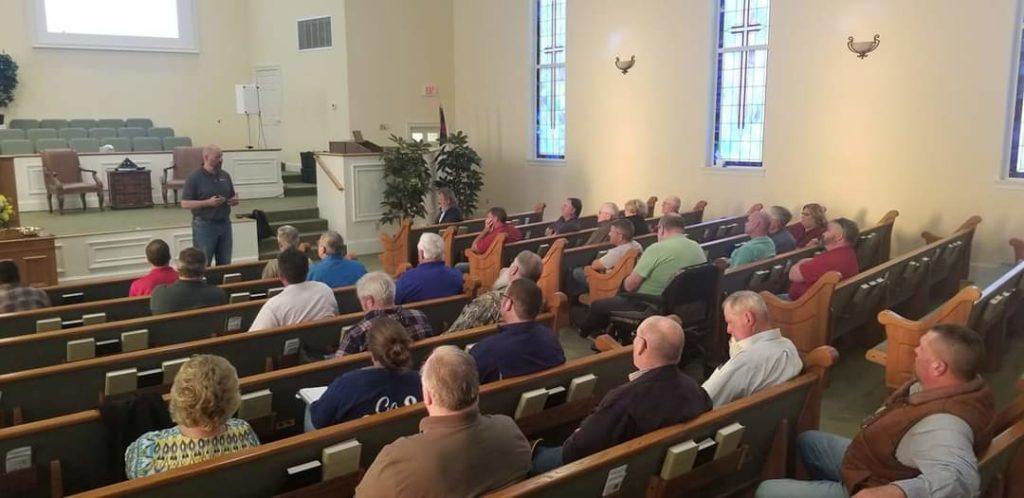Above: Ben O’Neal, church security and safety specialist with the Georgia Baptist Mission Board, talks to a group on the issue. Photo provided by Ben O’Neal
NASHVILLE, Tenn. (BP)—Churches are taking another look at their security plans after a weekend when 10 died in a shooting at a Buffalo, N.Y., grocery store and another the next day at a California church.
While variables can exist from church to church in establishing or modifying those plans, the concerns and preparation are largely consistent, one expert said.
“It’s a matter of scope, of scale,” said Mike Everett, director of security services for Bellevue Baptist Church near Memphis. “With churches it’s the same way. We all face the same issues, whether it’s budgetary or congregation size or the number of people you have to serve on your security ministry.”
Everett was working with a company that had given a security assessment at Bellevue before the church approached him with a job offer that he accepted in September 2021. Prior to that, he had served 23 years in law enforcement in southern Illinois as a patrolman and three-term sheriff.
Bellevue already had an established security team before Everett’s arrival. In 2016 that team took action in subduing a heavily armed man who entered the sanctuary during the church’s 11 a.m. Easter service. An alert greeter had noticed a pistol sticking out of the man’s jacket. Upon being interrogated by Bellevue’s then-director of security Andy Willis, a reserve officer with the Memphis Police Department, an automatic rifle and “lots of ammo” were found in the man’s backpack.
Both Everett and Ben O’Neal, who leads seminars and training for church security and safety through the Georgia Baptist Mission Board, point to the 2017 shooting at Sutherland Springs, Texas, First as a turning point of consciousness on the discussion.
“It taught us some things about layering security,” O’Neal said of the shooting that left 26 dead, including an unborn child. It’s important, he said, to have security in the parking lot as well as at the door to provide as many eyes as possible looking out.
“You need to identify potential threats as they pass through various levels,” said O’Neal, who had 23 years of active duty in the Army before retiring with the rank of major. Degrees in criminal justice and security management have helped him in security training for more than 600 Georgia Baptist churches. He also speaks to more than 200 groups a year through regional seminars.
Layering is only one part of beginning a security plan. Two of those killed at Sutherland Springs were outside the building, but most died when the shooter entered the building. Therefore, it’s important to limit the number of accessible doors going into the building, O’Neal said.
The concept applies to churches of all sizes. A small church could have a couple of volunteers in the parking lot and two more at the main entrance. Many churches have started locking those front doors once the service starts. But that doesn’t mean they have to be unwelcoming.
“Always have someone at the door ready to open it for those who are late,” O’Neal said.
Such measures don’t make a church cold, just cautious. And, it protects the ministry in the long term.
“If someone gets inside and causes a crisis, it’s going to hurt your ministry and outreach,” he said.
An intrusion doesn’t have to involve a gun. Recently, pro-abortion protestors disrupted the services of a Catholic church in Colorado over the leaked Supreme Court opinion pointing to the possible overturn of Roe vs. Wade.
“Your circumstances are going to dictate your tactics (in that situation),” Everett said. “Be careful that a group or individual isn’t trying to create the ‘video moment’ that can be passed around on social media. The reports will be based on your reaction, not their action that led to it.”
O’Neal suggests a level of expediency, however.
“React immediately and get them out of the sanctuary. Return things to normalcy as soon as possible,” he said. “You have the right to physically remove protestors.”
When it comes to firearms, both recommend checking with the church’s insurance company and applicable laws. “It’s an administrative decision that needs to be made through prayer,” Everett said. “Whatever your governing body is, they need to decide with the proper information.”
Central to any security ministry or team is training, they agreed.
“It protects your growth and gives you credibility,” O’Neal said. “It communicates that when you bring your family to that church, they’re going to be safe. You have somebody looking out for you so you can freely worship and learn.”
Having “a servant’s heart and a warrior’s mindset” doesn’t make for a good security plan, said Everett.
“Just having a concealed carry permit doesn’t prepare you for what to do in a congregation setting. It’s about the type and quality of training, not just the number of hours.”
Diligence is wise when researching church security firms, they said. On May 16 the Arkansas Baptist News reprinted an article from February 2021 on things to consider when building a church safety team. The Department of Homeland Security also provides guides and resources for faith-based events and houses of worship.
“We need to get the training,” Everett said. “You want to be able to say you’ve done your best to prepare.”






